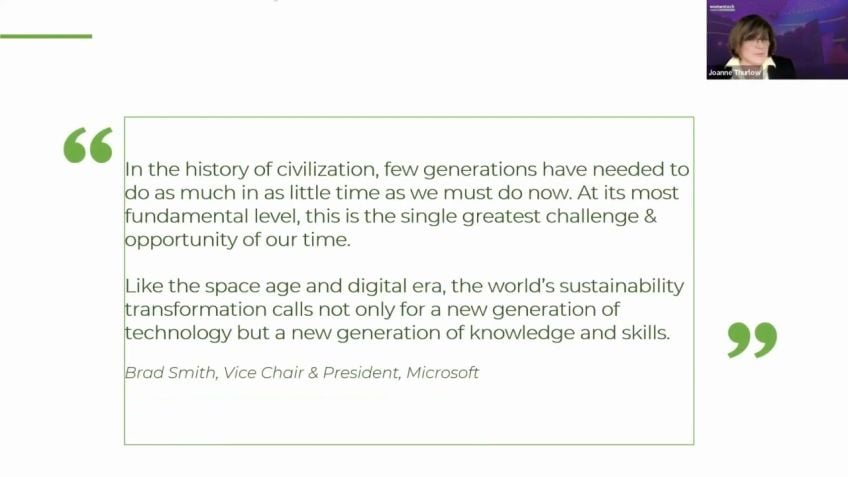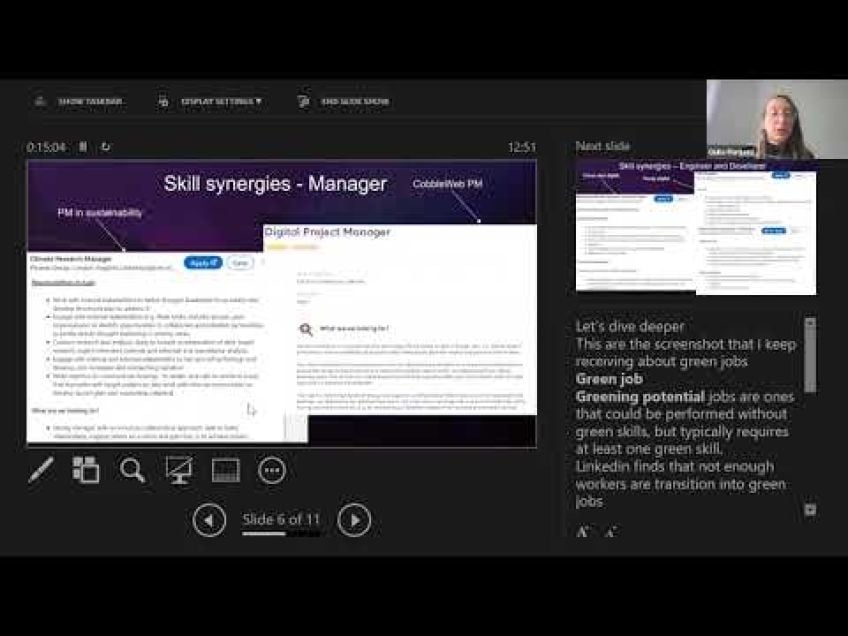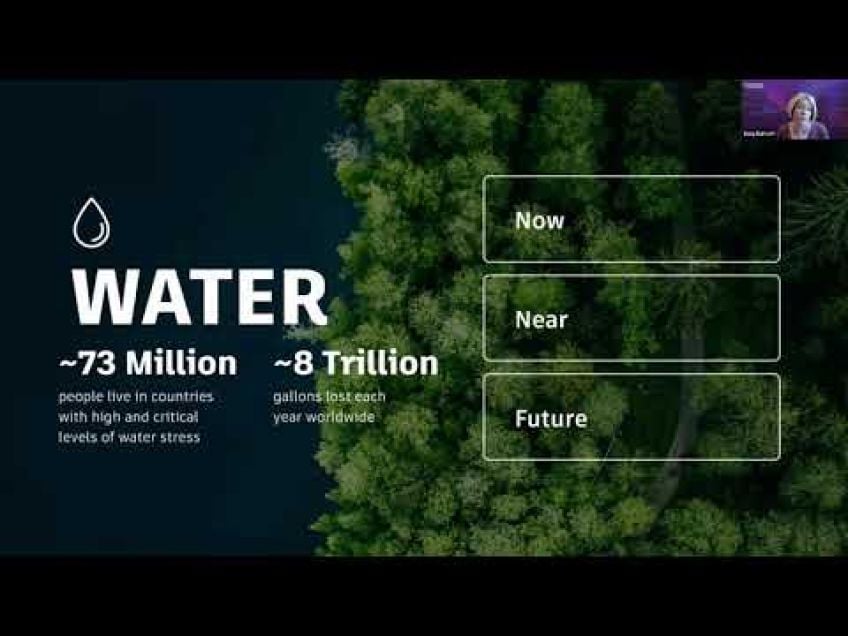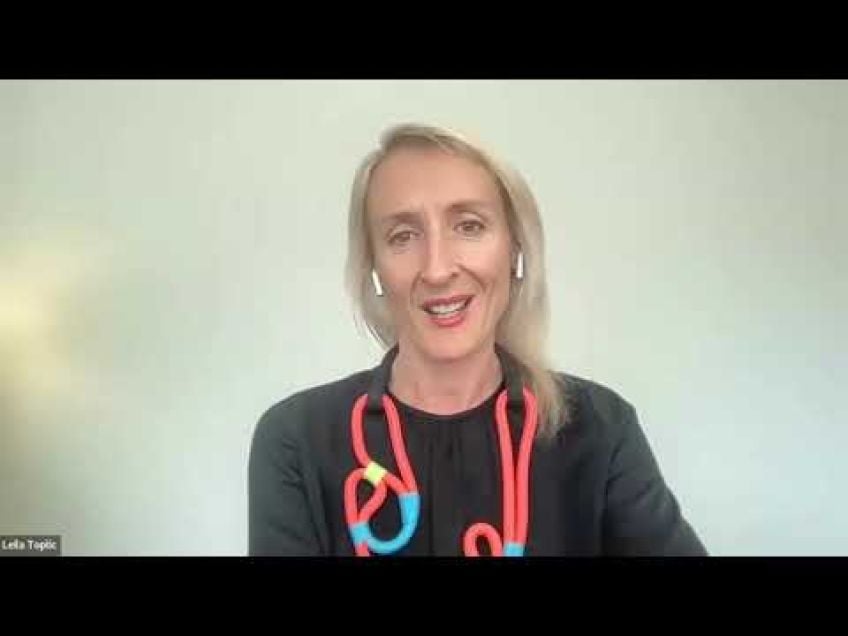From the theoretical to the impactful: the journey of a climate tech founder
Charlotte Degot
Founder and Chief Executive OfficerA Climate Tech Founder’s Journey: How Charlotte de Gaul Is Making A Difference
With so much discussion around climate change and a need for decisive action, voices from all sectors are intent on making a difference. One such voice is Charlotte de Gaul, CEO of CO2 A I. Her journey as a climate tech founder isn't just compelling — it also provides key takeaways for anyone looking to make a significant difference in this critical field.
Climate Change: Urgency and Opportunity
The urgency of climate action is evident in the goal to reduce global emissions by 50% by 2030 to limit global warming to 1.5 degrees, a target agreed upon by scientists during the 2015 Paris Agreement. Unfortunately, global CO2 concentration in the atmosphere keeps increasing, largely due to industrial activities.
Large corporations play a crucial role in influencing climate change. Challenges exist, but with the right tools, data, and enablers in place, changing the way businesses operate can significantly alter the narrative. That's where climate tech — and more specifically CO2 A I — comes in.
The Birth of CO2 A I
Less than 10% of companies measure their emissions comprehensively, and less than 1% of companies reduce their emissions in line with their targets. Realizing a gaping need for accurate measurement of climate impact and assistance for companies looking to reduce their emissions, Charlotte de Gaul decided it was time to act. By creating CO2 A I, she took the first steps towards building a tool that would help large corporations manage their net-zero journey.
The Journey of CO2 A I
- The journey started with a vision and a strong desire to make a difference.
- By seizing opportunities, they were able to gather budgeting and find clients willing to co-develop the idea.
- Persistence, innovation, and seizing every small opportunity available were crucial during its early stages.
Creating a climate tech product that solves pressing issues of companies isn’t easy — the climate change topic is complex, and the needs of clients are constantly evolving. However, with customer focus, an impact-driven culture, and constant innovation, CO2 A I was able to create a product that has since been aiding companies in reducing their greenhouse gas emissions.
Takeaways
The journey of a climate tech founder isn’t necessarily easy – it demands creativity, perseverance, adaptability, and a strong commitment to make a measurable difference. But the journey of Charlotte de Gaul and CO2 A I has shown that it's not just possible, but can also lead to an impactful solution.
To every climate tech enthusiast, or anyone aspiring to make a difference in this pressing global issue, sharing stories of solutions such as CO2 A I is a valuable step forward. The more companies know about these resources, the more we can collectively accelerate efforts to mitigate the effects of climate change.
Take the challenge, make an impact, and be part of the solution.
Video Transcription
Hello, everyone. Uh I hope you can hold me well.Uh I'm extremely happy and excited uh to be here today and to talk about um uh my journey as a climate tech founder and therefore uh talk more about uh this um extremely pressing issue for humanity, which is climate change. Uh And that has been driving my work uh for the past two 2 to 3 years. Um I hope you can hear me well. Yeah, I'm not sure. Ok, let me, let me restart because I'm, I think you, you just uh all joined. So welcome everyone. I'm uh extremely happy to be here and to talk about my uh climate uh tech founder uh journey. I'm Charlotte de Gaul. I'm the founder and CEO of CO2 A I CO2 A I A um sustainability as a service platform that helps large corporations manage their uh end when zero journey. Our goal and vision is to help uh those large corporations reduce as fast as possible uh their emissions um uh as they have a huge um power uh when it comes to uh influencing climate, climate uh the climate crisis overall.
Um We are here uh today and we are going to discuss about climate change. I'm not going to be depressing, but I just want to uh remind uh all of us that this is urgent. Uh We collectively need to reduce our emissions by 50% by 2030 to limit global warming to 1.5 degrees. This is um what all scientists agree on and that was said already at the time of the Paris Agreement in 2015, um the issue is that uh we keep increasing emissions and what you see here is the uh CO2 uh concentration in the atmosphere. It has just been skyrocketing uh over the past uh 50 plus years, uh massively driven by our uh industrial activities. And um given this, uh we all know that uh businesses uh companies have a massive uh role to play uh by changing the way they do business and they can uh very quickly help uh shifting the trend. The thing is so far um they are struggling and they are strugg struggling for many reasons. But one of the reasons is that they lack uh the enablers to really do it um changing the way you do business.
Uh when you are a large uh corporation uh uh with multinational activity uh activities is just a massive transformation and this will not happen um uh easily and requires to have uh the right tools, the right data, the right enablers in place. Of course, uh this is not the, the, the solution and it will not solve everything, but that's definitely part of the solution. So, what I'm gonna talk today about is my personal journey as a founder in the climate tech field, uh we will talk about uh what it means to create a tech business because uh uh first and foremost, this is what I use uh creating a product, creating a team, creating a business, making it viable.
And that's uh uh clearly part of my uh day today. We will also talk about what it means to be a founder. And in my um personal journey, it meant moving from strategic consulting to artificial intelligence and then uh to uh CO2 A I and then we will also talk and that what makes uh CO2 A I uh spec specific uh we will talk about what it means to align one's job uh to um your own values.
Uh And that's uh that's the, the journey I've been going through uh with CO2 A I. So to start with and maybe to talk a bit more about uh the journey and, and how I ended up uh creating a CO2 A I um personally and like many people uh I think uh uh of our generation, I've always been uh concerned by climate change. I can recall the time when um I was uh in primary school and my teacher taught me about climate change. Um I, I can, I can remember the fact that it was approximately the same year as the, the year the Titanic movie was out. And, uh, I was, at that time, I was thinking, um, adults are so intelligent, they see things coming, they see issues coming, but at the same time, they are so stupid. They don't act to, to until they, they, they eat the iceberg. And I, and I was really wondering, are we, are we doing the same thing with climate change? Are we just waiting and hearing the alarm bell? But uh not, not moving. So I was a kid at the time. So I just, it was like kid type of thinking but, but I've, since, since my really young age, I've been uh I've been really uh anxious about climate change. And then um uh with time uh II, I studied that in the business school.
I also did a bit of um science, statistics and data and I joined BC G uh right after school, I was a strategic consultant there. Um I learned a lot about business about how large corporations work about what it means to actually have an impact uh um in your, in your work because uh this is what I've always loved and I have been always impressed uh with B CD is the ability that uh B CD and the culture and um and also the, the, the focus on um making sure that you bring uh impact and you really help your clients on their most pressing strategic issues.
Um And those were uh years that I really enjoyed and I loved uh working at BC G as a strategic consultant. And then a few years in the job, uh BC G gamma was created the, it was BC G entity focusing on artificial intelligence and data science. And I thought, oh my God, this is a, an even better way to have an impact at my clients because on top of like the the skills of strategic consulting that I have uh won through time now, I can also use uh a tool and enabler which is data, data science, artificial intelligence to be even uh to have even stronger, quicker impact uh and, and solve the same issues but with a bigger scale and, and bigger impact.
So I really wanted to join the CG gamma. I went out a bit of my comfort zone because I was not as a data scientist um as a training. So I went back to school uh to learn uh data science. Um I'm not gonna say I'm a good coder, but I'm I know enough to be able to uh have informed discussions uh with data scientists to know what is feasible, to think how to combine business issues with uh data science and tech to put tech as uh to put tech as an enabler uh to those um business issues.
So then a few years at BC G gamma, extremely interesting uh really solving uh big strategic issues uh for large corporations with data science. Um and impact really started to be a common theme because this is what I was enjoying at BC T GAMMA. I was enjoying the fact that um we could really measure right away uh the impact that we were having. And at some point, I was just, I was 10 years at BC G at the time And uh I was thinking it's, I've learned skills that are amazing. And I'm really happy about the job I doing day to day. But I, I just liked the focus on issues that really matter to me. And that started to be again, waves of uh maybe on ct about climate change that we're coming back. And so I started to just look at what could be done with A I, what could be done with tech to um help on climate change. And it really started in an humble way, you know, just starting with pro bono projects, uh things that I was doing on the side, just trying to do what I, what I could do my fair share of, of effort uh on climate change um and progressively a bit naturally. Uh The uh the way I idea uh started to, started to uh started to be created uh Co2 8 just came from what you see on the page.
Less than 10% of emissions, uh less, less than 10% of companies measure their emissions comprehensively and less than 1% of emissions of companies are reducing their emissions in line with their targets. So we've clearly clearly have a massive issue of measuring properly uh climate impact and then helping uh companies uh reduce their emissions. At the time, I was working for a large company which uh has made big sustainability claims. Uh And I was clearly noticing the lack of data on climate change. So I just wanted to help uh with the means I had to help measure and then help reduce uh the climate impact. And it all um then started to be, I would say baby steps and seizing opportunities and finding sponsors. Um Once you get uh the idea, um in my case, it was like very specific opportunities. But I, I'm pretty sure that as any idea and anything in life, it works a bit the same seizing opportunities seizing a sharp tongues. She, she seizing a uh in a moment where you have an innovation context uh contest uh that allows you to present your idea to get a bit of budget.
And from this budget, uh try to um find um a first client who wants to co develop uh the idea with you, et cetera. So really, I could enter in the details. But um from the moment II, I got the idea until the moment where we reached out uh uh the time where we had um a real uh product in place. It was a succession uh baby steps after baby steps and just seizing the opportunities. And also um in the case of CO2 I I, we were lucky enough to have very strong sponsors within BC G who really believed in the idea and believed in the fact that it was important uh to invest and to build an innovative product to solve uh this issue. And this was um clearly uh an a huge accelerator uh in the development of, of, of CO2 I I. Uh of course, it came uh with uh many challenges and um and um and many um uh difficulties uh because then it started to be like any business creation, uh build a gym, build a product, uh sell this product, create the right culture, et cetera, et cetera. Uh If I may maybe just zoom on one challenge um uh which is particularly important for me. Uh It's about creating the right product um in the field of climate tech.
Uh I think it's maybe even more difficult than in any tech uh uh field um to really create a product that is really amazing and really solve your customer uh most pressing issues. Um It's tough be in in the field of climate change at least because uh climate change is a very complex topic. Uh You really have to understand it deeply. It's a topic where it's constantly evolving um uh regulation is evolving. The client's needs are evolving all the time. Uh They are not really, they are, they, they know what they need at a single point in time, but in their investors, their consumers, their customers, their suppliers, their regulation always comes and adds up uh some complexities, some requirements to what they need, et cetera.
So it's constantly changing and um finding the best product in this uh constantly changing environment is tough and it comes through and the recipe that we have found is uh constant customer focus, really uh making uh sure that you're coding with them. You keep this impact driven culture where you start, you, you only do things and you only build things in the product that you are sure are going to really be impactful for your clients. And also enabling in the team in the team, a culture of f think out of the box innovation, be creative. Do not fear to be creative because this is what we will need uh to reach um reach the right product and ultimately help uh large corporations reduce their emission and, and get to net zero. So I, I could talk a lot about the journey, a lot more about the journey, a lot more about the challenges. But this one about creating a product which is really delighting our customers uh was very uh very important for me. And uh and I believe uh very important for any climate tech uh company given the the changes um that we see in the field.
So where we are today, uh two year, more than two years down the road is we have a product uh which is working, we are lucky to have happy uh clients who are using it uh with uh thousands of users and managing um uh already today. A lot of uh greenhouse gas emissions in CO2 A I uh we are helping them in day to day reduce their emissions. Um I think that makes me and the team uh very proud. It's only the beginning of the journey. Uh We have plenty of ideas, plenty of things that we want to do uh in the product and as an offering to our clients, uh we know that we are working against the clock because the time is running and um we just don't have time to lose. Um So I hope you enjoyed this speech. And um if there is one thing you can do for CO2 A is speak about uh the fact that this type of solutions to help manage uh your carbon footprint exist and they really help uh companies accelerate their, your journey. Uh So um just speak about that and influence people uh to accelerate. Don't hesitate if you have uh questions in the chat. Uh I hope I can see them and if I can, I will answer them, I don't see questions. So thanks a lot for listening and um and have a great rest of your day. Have a great day. Bye bye.






